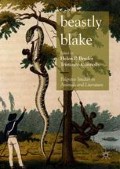Abstract
This chapter reads Blake’s Lyca poems (‘The Little Girl Lost’ and ‘The Little Girl Found’) as political fables. Using Derrida’s analysis of sovereign power as a performance embodied in the fable, the chapter argues that Blake’s Lyca poems embody the parasitical potential of the fable and subversively stage the performativity of violent political power. It closely reads the tension within these poems between their beastly figures: the lion and the wolf, the sovereign and the little girl. It makes the case that Lyca be considered Blake’s first strong female character. For Lyca’s act of sleeping, which is a form of ‘recessive action’ in the sense outlined by Anne-Lise François, dethrones sovereign power.
Access this chapter
Tax calculation will be finalised at checkout
Purchases are for personal use only
References
Adams, Hazard. 2010. William Blake on His Poetry and Painting. Jefferson, NC: McFarland.
Agamben, Giorgio. 1998. Homo Sacer: Sovereign Power and Bare Life, trans. Daniel Heller-Roazen. Stanford: Stanford University Press.
Ankarsjö, Magnus. 2009. William Blake and Religion. Jefferson, NC: McFarland.
Bewick, Thomas, and John Bewick. 1784. The Select Fables of Aesop and Others. London: R. Dodsley.
Blake, William. 1998. The Complete Poetry & Prose of William Blake, rev. ed., ed. David Erdman. New York: Doubleday.
Blake, William. 2017. The William Blake Archive, ed. Morris Eaves, Robert N. Essick, and Joseph Viscomi. http://www.blakearchive.org.
Bloch, R. Howard. 2004. The Wolf in the Dog: Animal Fables and State Formation. Differences: A Journal of Feminist Cultural Studies 15 (1): 69–83.
Bruder, Helen. 2006. Blake and Gender Studies. In Palgrave Advances in William Blake Studies, ed. Nicholas M. Williams, 132–166. Basingstoke: Palgrave.
Cixous, Hélène. 1993. We Who Are Free, Are We Free? trans. Chris Miller. Critical Inquiry 19 (2): 201–219.
Coleridge, Samuel Taylor. [1817] 1971. Biographia Literaria; Or, Biographical Sketches of My Literary Life and Opinions, vol. 1. Menston: Scolar.
Cuvier, Georges. 1824–1835. The Animal Kingdom. 15 vols. London: Geo. B. Whittaker.
Derrida, Jacques. 2009. The Beast and the Sovereign: Volume 1, trans. Geoffrey Bennington. Chicago: University of Chicago Press.
Dugaw, Diane. 2001. ‘Deep Play’: John Gay and the Invention of Modernity. Newark: University of Delaware Press.
Effinger, Elizabeth. 2012. (Con)Figuring the Feminine in The Book of Thel. In Blake, Gender and Culture, ed. Helen P. Bruder and Tristanne Connolly, 123–131. London: Pickering & Chatto.
François, Anne-Lise. 2008. Open Secrets. Stanford: Stanford University Press.
Freud, Sigmund. [1930] 1962. Civilization and Its Discontents, trans. James Strachey. New York: Norton.
Gardner, Stanley. 1986. Blake’s ‘Innocence’ and ‘Experience’ Retraced. London: Athlone.
Gay, John. 1793. Fables by John Gay. London: J. Stockdale.
Gleckner, Robert. 1959. The Piper and the Bard. Detroit: Wayne State University Press.
Godwin, William. [1797] 2000. The Enquirer: Reflections on Education, Manners and Literature in a Series of Essays. Selections in Fleetwood, ed. Gary Handwerk and A.A. Markley, 429–438. Peterborough: Broadview.
Godwin, William. [1805] 2014. Fables Ancient and Modern. In Romantic Circles, ed. Suzanne L. Barnett and Katherine Bennett Gustafson. http://www.rc.umd.edu/editions/godwin_fables/index.html.
Hegel, G.W.F. 1975. Aesthetics: Lectures on Fine Art, trans. T.M. Know, vol. 1. Oxford: Clarendon.
Herder, Johann Gottfried. 2006. Selected Writings on Aesthetics, trans. and ed. Gregory Moore. Princeton: Princeton University Press.
Keenan, Thomas. 1997. Fables of Responsibility. Stanford: Stanford University Press.
Krell, David Farrell. 2013. Derrida and Our Animal Others. Bloomington: Indiana University Press.
Lamb, Charles. 1935. The Letters of Charles Lamb to Which Are Added Those of His Sister Mary Lamb, ed. E.V. Lucas. 3 vols. London: Dent.
Lewis, Jayne. 1996. The English Fable: Aesop and Literary Culture, 1651–1740. Cambridge: Cambridge University Press.
Locke, John. [1693] 1964. Some Thoughts Concerning Education. London: F. W. Garforth.
Magnuson, Paul. 1998. Reading Public Romanticism. Princeton: Princeton University Press.
Matoba, Tomoyuki, Nobuyuki Kutsukake, and Toshikazu Hasegawa. 2013. Head Rubbing and Licking Reinforce Social Bonds in a Group of Captive African Lions, Panthera leo. PLoS One 8 (9). http://journals.plos.org/plosone/article?id=10.1371/journal.pone.0073044.
Merleau-Ponty, Maurice. [1995] 2003. Nature: Course Notes From the College de France, trans. and ed. Robert Vallier and Dominque Séglard. Evanston, IL: Northwestern University Press.
Mitchell, Robert. 2012. Cryptogamia. In Romanticism and Modernity, ed. Thomas Pfau and Robert Mitchell, 199–219. New York: Routledge.
Oliver, Kelly. 2011. Between the She-Wolf and Little Red Riding Hood: The Figure of the Girl in Derrida’s The Beast and The Sovereign. Derrida Today 4 (2): 257–280.
Peterfreund, Stuart. 1975. The Name of Blake’s Lyca Re-examined. American Notes and Queries XIII: 133–136.
Punter, David. 1997. Blake: His Shadowy Animals. Studies in Romanticism 36 (2): 227–238.
Richardson, Samuel. [1739] 2012. Aesop’s Fables. In Early Works, ed. Alexander Pettit, 99–320. Cambridge: Cambridge University Press.
Rousseau, Jean Jacques. [1762] 1979. Emile: Or, On Education, trans. Allan Bloom. New York: Basic Books.
Scott, Sir Walter. [1832] 1913. Count Robert of Paris. London: Adam and Charles Black.
Serres, Michel. 1982. The Parasite, trans. Lawrence R. Schehr. Baltimore: Johns Hopkins.
Still, Judith. 2015. Derrida and Other Animals: The Boundaries of the Human. Edinburgh: Edinburgh University Press.
Trimmer, Sarah. 1786. Fabulous Histories. London: T. Longman, G. G. J. and J. Robinson and J. Johnson.
Welch, Dennis. 2011. Blake and Rousseau on Children’s Reading, Pleasure, and Imagination. The Lion and the Unicorn 35 (3): 199–226.
Wollstonecraft, Mary. 1788. Original Stories, From Real Life. London: J. Johnson.
Author information
Authors and Affiliations
Corresponding author
Editor information
Editors and Affiliations
Rights and permissions
Copyright information
© 2018 The Author(s)
About this chapter
Cite this chapter
Effinger, E. (2018). In the Company of Wolves: Blake’s Lyca Poems as Political Fable. In: Bruder, H., Connolly, T. (eds) Beastly Blake. Palgrave Studies in Animals and Literature. Palgrave Macmillan, Cham. https://doi.org/10.1007/978-3-319-89788-2_4
Download citation
DOI: https://doi.org/10.1007/978-3-319-89788-2_4
Published:
Publisher Name: Palgrave Macmillan, Cham
Print ISBN: 978-3-319-89787-5
Online ISBN: 978-3-319-89788-2
eBook Packages: Literature, Cultural and Media StudiesLiterature, Cultural and Media Studies (R0)

